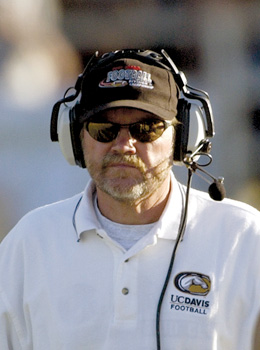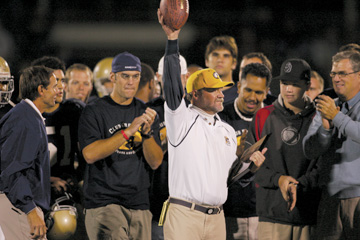Volume 25 · Number 2 · Winter 2008
Sports

Retiring Assistant Coach Fred Arp (Photo: Wayne Tilcock)
So Long, Club Fred
Aggie football says goodbye to Assistant Coach Fred Arp, who’s been a part of the program for half of its 90-year history.
End of the Streak
All good things must come to an end, and for UC Davis, the end of a 37-year streak of consecutive winning football seasons came on Oct. 27 when South Dakota State beat the Aggies 28-21, thereby ensuring the program’s first losing record since 1969.
The emcee at a recent luncheon promoting the 54th annual Causeway Classic football game couldn’t help taking a jab at Fred Arp, joking the longtime UC Davis assistant coach had been around the program for so long that he had had played for “Crip” Toomey, the Aggies’ coach in 1928–36.
Current head coach Bob Biggs joined in the fun later, remarking that it wasn’t true that Arp played for Toomey. Rather, he said, Arp played with him. Even Arp brought a chuckle from the crowd when he said, despite what others may think, he was not at the first Causeway Classic.
He might not have been at the inaugural matchup between UC Davis and Sacramento State in 1954, but he’s been a part of nearly every notable Aggie game since. Arp, who is retiring after a 44-year association with UC Davis as a player and coach, has been part of the team for more than 300 wins and more than half the program’s 844 games.
He has seen both ends of a streak of 37 consecutive winning seasons and 20 straight conference championships, and has been a part of an NCAA Division II record 18 postseason appearances.
More importantly, though, the inspiration behind “Club Fred” — the name his defensive linemen have given themselves — has impacted the lives of hundreds of student-athletes.
“I think when everybody looks back at Fred’s career, it’s not going to be about x’s and o’s. I don’t think people are going to talk about how Fred made them a greater football player,” said Biggs. “What they’re going to talk about is Fred making them a greater person.”
Arp played a couple of seasons after transferring to UC Davis in 1963 but was unable to play as a senior. A coaching opportunity surfaced with the junior varsity, and Arp found his calling. He joined the varsity coaching staff in 1968.
Save for 1972 when he went to graduate school at the University of Northern Colorado, Arp has been a fixture on the Aggies’ coaching list, first under Herb Schmalenberger (1967–69), then Jim Sochor (1970–88) and later Bob Foster (1989–92) and Biggs (1993–present).
Throughout those years of unparalleled success, Arp was the one constant.
“Fred is like the program historian,” Biggs said this fall to a CSTV crew on campus to chronicle “Club Fred.” “He’s seen it all through all the great years that we’ve had the last 40 years. He’s the one person, I think, who could put perspective on where the program’s been, where it is now and where we’re heading.”
Arp, whose wife has been on the sidelines taking photographs for as long as he’s been coaching, also works with his son, Ben, to make an annual highlight film and maintains a historical Web site about the program. Arp also started a film about “the streak” several years ago.
It’s made Arp uniquely qualified to recount the Aggies’ evolution into a nationally prominent program.
1970’s
UC Davis was 3-7 in 1969 and was looking for a fresh approach after an era that had just eight winning seasons in its previous 20. In came Sochor who had enjoyed success at San Francisco State and desired the same with the Aggies.
“We modernized what we were doing,” said Arp. “We brought some youth into the program, brought Bob Foster in, brought some aggressive new ideas in.”
UC Davis finished 6-4 in 1970, the first of three straight winning seasons. A new attitude was developing that solidified in 1972 when the Aggies won their first Far West Conference title in nearly a decade.
“And now all the things we had been trying, led by Jim, to instill in the kids — that you never give up, that if you stick together and play hard you could overcome adversity — the kids started really believing with that championship,” he said.
If that was one of the most important wins of the decade, the crowning moment came in 1977, Arp said, when the unbeaten Aggies hosted a nationally ranked Nevada squad at a packed Toomey Field. UC Davis easily won, 37-21, and eventually finished 11-1.
“By beating Reno and beating them convincingly, we proved to the people who make decisions about the playoffs that [we were] for real,” he said.

(Photo: Wayne Tilcock)
1980’s
Consistent wins in the 1970s led to greater ambitions in the ’80s. That proved to be a challenge after an impressive 7-2-1 record in 1980 was followed by an inauspicious start in 1981, which saw the Aggies’ first league defeat in seven years — one of just three during their entire 20-year run of championships.
“Jim, to his credit, just kept talking positive with the kids, with the staff,” said Arp. He noted that the team quarterback was Ken O’Brien, who would go on to play in the NFL, which put the team in a good place to start. “But then we won 17 straight games, which culminated in the win over North Dakota State in 1982.”
The win over the powerful Bison, who in 1981 played in the national championship, was defining not only for vaulting UC Davis into its only appearance in an NCAA final but also for the recognition it brought the nonscholarship Division II program.
“It was important as a reinforcer to our kids and our coaching staff, but I think it was a reinforcer to the D-II people in the nation that “Yeah, [Davis] is consistently going to be there,” he said.
The Bison got the best of the Aggies during their subsequent playoff showdowns in the 1980s on their way to three NCAA championships. It was the type of success that seemed just out of reach for UC Davis, especially after an 11-win season in 1983, a 10-victory campaign in 1986 and just three regular-season losses in five years.
1990’s
By 1990, two decades of winning seasons, conference titles and the playoffs had made success an expectation. The Aggies won league titles three times early in the decade and went to the playoffs once.
But six-win seasons in 1994 and 1995 didn’t result in playoff bids and 1996 was heading the same way when UC Davis managed to sneak into the postseason at 6-4. The Aggies’ reward? A trip to play the No. 1 team in the country.
“I can remember [Athletics Director] Greg Warzecka coming into the locker room after the [last] game and saying, ‘Well, we made the playoffs. We’re going to Texas A&M–Kingsville,” said Arp. “It sounded like a death sentence at the time.”
But the Aggies stunned Kingsville with a 17-14 win. It was important for obvious playoff reasons but also brought renewed momentum to the program, Arp said, resulting in more successful recruitments, increased confidence and a string of seven straight playoff appearances.
2000’s
The current decade is the most noteworthy for the program. What began with an undefeated regular season and a run to the NCAA semifinals in 2000 gave way to a four-year transition period to Division I when postseason play was prohibited.
The new $31 million Aggie Stadium was on the drawing boards but wouldn’t be completed until 2007, and Arp said keeping the team focused on the long-term was a motivational challenge. It was a roadblock, though, that was met head-on with winning seasons each year of the reclassification.
And despite all of the changes to the Aggie program over the past seven years, the only date most will remember is Sept. 17, 2005. What wins over North Dakota State in 1982 and Texas A&M–Kingsville in 1996 did for the program was multiplied tenfold by the shocker at Stanford in 2005.
“Just playing Stanford revitalized a lot of the alumni,” said Arp. “To accomplish that feat, to beat them, when nobody gave us a prayer, was incredible.”
Now Arp will be a fan as he watches how the rest of the decade unfolds. He plans to attend every game in 2008 and will still help the program with scheduling, and jersey number and locker assignments. Arp has seen the beginning and end of the winning streak and said, despite its signature status among fans, it is not the program’s trademark.
“Aggie football is not about the streak,” he said. “It’s about ‘Aggie Pride,’ which is nebulous and hard to define. But it’s a feeling inside, the way you conduct yourself and the way you play.”
For Arp, that’s what it’s been about all along.
Mike Robles is assistant athletics director for media relations.
